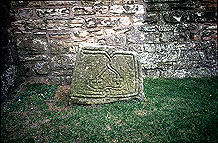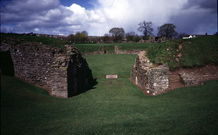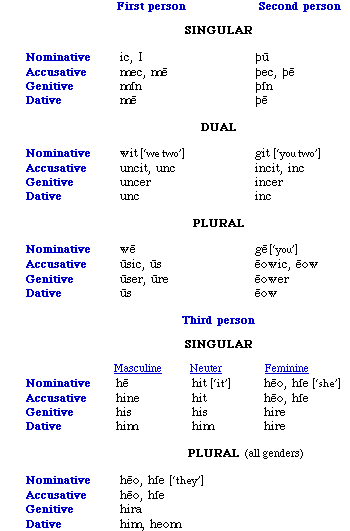Once we move into a discussion of
Old English, we are moving away from the more speculative (but
systematic) endeavors of language reconstruction (Indo-European)
into an area for which we do have more solid footing--in the form
of written documents.

Stonehenge
©Daniel W.
Mosser
|
Before the Germanic settlers
arrived in Britain and became the first speakers of
"English," other peoples had claimed the island as their
home. The first inhabitants for whom we have linguistic
knowledge were the Celts, who arrived around the time of
the Bronze Age (2000-500 B.C.). They were almost
certainly the first speakers of an Indo-European
language to
arrive.
|
In 55 B.C.E. Julius Caesar attempted an
invasion of Britain, but he was not to succeed until the following
year (54 B.C.E.). How successful he was, however, is perhaps
suggested by the fact that the tribute Caesar demanded before
returning to Gaul was never paid.
In 43 C.E., the Emperor Claudius, with
40,000 men, was far more successful, although the Romans never
penetrated far into Wales or Scotland. Hadrian's wall marks extent
of the Roman Governor Agricola's rule northward. The lands south
of the Wall were ruled by Romans for over 300 years. The Romans
built roads, baths (such as those at Bath), temples, and
introduced Christianity. By the end of the Roman occupation, the
subjugated Celts had apparently lost the ability to defend
themselves against the Picts and Scots from the north. When the
legions withdrew in 410 C.E. to defend the diminishing Empire, the
Celts began to look elsewhere for defensive aid.
The origin of English is customarily
linked to the date 449 C.E. This is the year in which the
Anglo-Saxon Chronicle (Laud MS version) records the issuing of an
invitation by Vortigern (king of the British, or Celts) to the
"Angle kin" (Angles, led by Hengest and Horsa) to help them in
their defense against the Picts. In return for their military
assistance, the Chronicle says the Angles were granted lands in
the southeast. Further aid was sought, and in response "came men
of three peoples of Germanie": "of Ald Seaxum of Anglum of Iotum"
(Saxons, Angles, and Jutes). The Anglo-Saxon Chronicle documents
the subsequent influx of "settlers," and over the course of the
next century-and-a-half the newcomers establish seven kingdoms,
known as the Anglo-Saxon Heptarchy: Northumbria, Mercia,
East Anglia, Kent, Essex, Sussex, and Wessex. The earlier Celtic
inhabitants were dubbed Wéalas, the plural
form of wealh--meaning "foreigner, stranger,
slave"--from which comes Welsh (see also McCrum,
Cran, & McNeil
43).
The terms English, England, and East
Anglia are derived--fairly transparently--from words referring to the
Angles: Englisc (vernacular writers referred to themselves by
this term), Angelcynn, and Englaland. The
similar OE word engel--"angel"--inspires Pope Gregory to pun
on the two words (as recounted in Bede's Historia Ecclesiastica Gentis
Anglorum [the Ecclesiastical History of the English People]).
(Kings
of Wessex) Egbert, the West Saxon chief,
having reclaimed his throne from Mercian dominance, ruled all of England and
Wales from 830 until his death in 839. His son, Æthelwulf maintained
his father's kingdom and around 849 he added Berkshire to the holdings of
the West Saxon kingdom. In 855, while on pilgrimage to Rome, he married Judith
(then thirteen years old), daughter of Charles the Bald, the king of the West
Franks. Meanwhile, his oldest son, Æthelbald, and the nobles of Wessex,
stripped Æthelwulf of his kingship, and West Saxon kingdom was sundered,
with Æthelbald getting Wessex and Æthelwulf taking Kent and other
parts of SE England. When Æthelwulf died in 858, his second son, Æthelberht,
took over those provinces. The elder son, Æthelbald, married his father's
young widow (Judith). When he died in 860, Æthelberht reunited the Anglo-Saxon
kingdom. But he died five years later, without heir, and his younger brother
Æthelred became king. Unfortunately for Æthelred, the sons of
Ragnar Lothbrok, "Ivar the Boneless" (born with gristle instead of bone) and
Halfdan, led the Danish in an attack on England, landing in East Anglia. Burgred,
the king of Mercia, had married Æthelred's sister, and now asked Æthelred
for help. Æthelred and his brother Alfred joined the Mercians,
but eventually, as we will see in the next
section, they had to pay the Danes for a
peace.

Anglo-Saxon Cross at Lindasfarne
©Daniel W. Mosser |
|

Statue of Alfred in Winchester
©Daniel W. Mosser
|
In 871 Æthelred died, and even though he left
heirs, Alfred was acknowledged as king. He became known to history as Alfred
the Great (871-899). In 886, he established a West Saxon occupation
of London, giving the Saxons renewed hope in their fight against the Danes.
Those areas of England not subject to Danish rule united under Alfred.
Alfred was instrumental in the establishment of literary
language, and he produced translations of the Bible, Pope Gregory's Pastoral
Care, Orosius, Bede's Historia Ecclesiastica Gentis Anglorum (The
Ecclesiastical History of the English People), Boethius' Consolation
of Philosophy. He has come to be known as the Father of English prose,
a tradition carried on and developed by Ælfric and Wulfstan.
Generally, when we study Old English today, our source
of texts is predominantly West Saxon, since Alfred's influence helped
to establish that dialect as a sort of literary standard. But there were
other dialects, the other three being Northumbrian, Mercian and Kentish.
Celtic
One might have expected the native Celts
to exert a major linguistic influence on the development of OE,
but this is not the case at all: the major influences were,
rather, Latin and Scandinavian (Old Norse). This certainly says
something about the attitude of the Anglo-Saxon peoples toward
those who had prior claim to the island. Richard M. Hogg suggests
that:
In the whole of Old
English languages it is doubtful whether there are more than
twenty Celtic borrowings into literary vocabulary (of which the
most widespread now, but not in Old English, is perphaps
cross). On the other hand, outside the literary
vocabulary a very large number of place-, especially river-,
names were retained by the invaders, hence Thames,
Severn, and settlement-names such as Manchester
(with the second element OE ceaster 'former Roman
settlement'). It would seem that, although relations were
sometimes friendly, the fifth-and sixth-century Anglo-Saxons
were in this respect as resolutely monolingual as their
twentieth-century descendants. (3)
Further illustrations of the constrained
nature of OE borrowing from Celtic, include:
- Devonshire <
Dumnonii (a Celtic tribe)
- Cornwall < "Cornubian
Welsh"
- Avon <afon, the
Welsh word for "river"
- Bryn Mawr <Welsh for
"big hill"
- cumb < Welsh cwm
"valley, glen" (e.g., Duncombe, Holcombe)
- brocc < Welsh
broch<Welsh for "badger" (e.g., "Brockhall")
This has been the traditional view of historians of the English language. But for such an utter lack of interaction to have occurred, the contact between Celts and Anglo-Saxons would have had to have been so minimal as to assume there were no Celts left alive. John McWhorter cites DNA evidence to establish that "only about 4 percent of British men's genetic material is traceable to a migration from across the North Sea" (12), meaning that native bloodlines remained dominant. In consequence, he argues that some syntactic features that are present only in English of all the Germanic languages most plausibly derive from the influence of the language of the native Britons, who spoke Celtic, primarily Welsh in those areas in contact with the Anglo-Saxons.
McWhorter suggests that what is sometimes referred to as "do-support" (the use of an auxiliary verb or "dummy-do" to form questions and negative statements in English) resembles the use of nes (meaning "did") in Welsh (pp. 5-6):
Did I open? |
Nes i agor? |
I did not open? |
Nes i ddim agor? |
I opened |
Nes i agor. |
Another "quirk" in English (vis-à-vis other Germanic languages) is the construction of the progressive aspect (-ing forms of verbs). The other -ing construction in English produces gerunds, or "verbal nouns" (cf. "Tom is running" and "Running is hard work"). Welsh uses verbal nouns to accomplish something quite similar to the English progressive structure (McWhorter, 9-10):
Mae Mair yn canu
(is Mary in singing) |
= Mary is singing (English) |
These features did not appear as part of the Anglo-Saxon written record, McWhorter, argues, because the written form of English did not always reflect innovation in spoken English(es). Thus, it was not until English resurfaced as a written language in the fourteenth century that these developments were reflected in written English (31, ff.). It seems plausible, then, that Celtic did affect the history of English, though primarily through syntactic rather than lexical or phonological contributions
Latin
Unlike the native Britains (Celts), the
Romans represented a higher civilization with tools and knowledge
worth borrowing, and with those tools and that knowledge they
brought the words or names needed to express them or refer to
them.
The influence of Latin is usually
described as resulting from three distinct periods (e.g.,
Baugh
and Cable 75-82; many of the
examples that follow are drawn from this source).
- Romans occupy continental homes
of Germanic tribes
- Romans under Claudius conquer
Britain in 43 C.E. (influence on OE via Celtic)
- Pope Gregory I sends mission
under Augustine to Christianize the English (597
C.E.)
How do we determine when a Latin word
was actually borrowed into the language?
Our written records only provide
evidence from ca. 700 C.E., so the appearance of word in
literature (written evidence) does not in itself tell us anything
about the word's history before that time, only that the word was
in the language from the date of its first appearance in a
document.
The occurrence of a word of Latin origin
in several Germanic dialects probably indicates that it was
borrowed during the continental period.
The best evidence is the phonetic form
of the word: systematic sound changes that occurred within
constrained dates can tell us that a word was either present in
the language before these sound changes occurred (and was
therefore "targeted" by those changes) or came into the language
after a given sound change had been effected (and thus was not a
"target").
In the course of the seventh century, a
sound change occurred in Germanic
known as i-umlaut (umlaut="alteration of
sound" in German). Words that were subject to this process
underwent a raising of certain vowels in stressed syllables as the
result of "attraction" to an i or j in
the following syllable (The tongue is in the top, front part of
the mouth when we pronounce i or j and,
in anticipation of this, the speaker unconsciously "raises" the
articulation of the preceding vowel). An example of consequences
of this process can be seen in the Latin word for
"cheese"--cáseus; which develops into OE
cíese (the letter 'c' in OE had the hard 'k'
pronunciation by default, but in the environment of high, front
vowels, became "palatal," with the "ch" sound at the beginning of
PDE "cheese"; see the discussion
in the Phonology & Spelling section below). Thus if we
find the change occurring in a word borrowed from Latin, it must
have come into the language prior to or during that change. The
palatal feature of that initial consonant in turn triggered a
process during the early OE period known as palatal
diphthongization: the word-initial palatal consonant
changed certain following stressed vowels in the same syllable
from single sounds (monophthongs) to double sounds
(diphthongs). We can say then that the word for "cheese"
had been borrowed during the Continental period, was still in use
during the prehistoric OE period, and has been in continuous use
from the time it was borrowed to the present day.
Another widespread soundchange evidenced in OE is
commonly referred to as "Breaking." Similar to the effect of "palatal diphthonization,"
in this process certain vowels (the monophthongs æ, e,
and i) "broke" into diphthongs (ea, eo, and io
respectively) when they occurred before an r+consonant, l+consonant,
or h. (Long
vowels also "broke" before h).
We can hear this in the differences between Standard and Nonstandard pronunciations
of American English in words like "help": this is the sound one hears in Southern
American English often associated with the characterization of "drawl." Breaking
would have to have occurred sometime between the Germanic invasion of England
in the middle of the fifth century and the oldest surviving texts in the first
half of the eighth (see Campbell
50; 109; the sound changes affecting OE are list chronologically in Cassidy
and Ringler [87] and presented in
more detail throughout the grammar sections of that text).
Based on tests like those described
above, we can characterize the three periods of Latin influence
and their contributions as follows:
During the Continental Period of
influence, some fifty words from Latin can be credited with a
considerable degree of probability to the ancestors of the English
in their continental homes. They include military words such as
camp ("battle"), segn ("banner"),
weall ("wall"), míl (mile);
business/trade words such as céap ("bargain,"
producing PDE words such as "cheap"), mangere
("monger," as in "fishmonger"), pund ("pound"),
mynet ("coin," as in "mint"), wín
flasce ("wine-flask"), pise (from Latin
pisum: "pea").
We also know that many of these words
are borrowed from Latin and are not Germanic cognates because they
have not been affected by the First Consonant Shift
(Grimm's
Law). If they had descended
directly from Indo-European, the initial consonant in words
spelled with c [k] would have been
[h], and the words beginning with f would
have instead begun with p.
The influence of Latin on OE (via
Celtic) from the period of Roman occupation of Britain is slight:
not more than five words can confidently be attributed to this
period. While the Celts adopted some 600 Latin terms, as mentioned
earlier,
the relationship between Celt and Saxon was not conducive to
borrowing. The most significant borrowings likely attributable to
this period are:
|
ceaster
|
< Lat. castra
("camp," "former Roman settlement')
|
|
port
|
< Lat. portus
("harbor," "gate," "town")
|
|

|
< Lat.
vícus ("village")
|

Ruins of a Roman Theater at
Caerleon
©Daniel W.
Mosser
-
The
Church
In 597, Pope Gregory I dispatched
a band of missionaries to the Angles. The leader of this band was
St. Augustine. In 601 Augustine was consecrated the first
Archbishop of Canterbury (Centwara="men of Kent" +
byrig="dwellings within a fortified wall"
[borough]). Along with the Church came the Roman
alphabet, which "was essential in the remarkable early development
of a vernacular manuscript tradition in Britain compared with what
obtained elsewhere in the Germanic areas" (Hogg
5). This actually marked the reintroduction of Christianity into
Britain, since the Romans had earlier converted the Celts during
the Roman occupation of the island.
Æthelberht, the King of
Kent, had married a Christian wife, the Frankish princess Bertha.
Within three months of Augustine's arrival, Æthelberht, too,
was baptized. By the time Augustine died seven years later, all of
Kent had become Christian. Within 100 years of Augustine's landing
all of England was Christian.
By the close of the OE Period, about 450
words appear in English writings as a result of the Christianizing
of Britain. The semantic categories include religion
(abbod ["abbot"], alter
["altar"], canon, cleric,
discipul, engel ["angel,
messenger"], martir ["martyr"],
mynster["monastery, nunnery"],
nunne ["nun"], purpure
["purple (garment)"], food
(rædic["radish"],
loppestre ["lobster"],
merscmealwe ["marshmallow"], medicine, and
education (grammatic ["grammatical"],
fers ["verse"]), along with others dispersed
across the lexical spectrum.
Also of interest are the new words
created from Anglo-Saxon roots to express the new concepts
introduced through contact with Latin speakers. Old English
retained God rather than borrowing
deus, along with heaven (OE
heofon, "sky") and hell.






